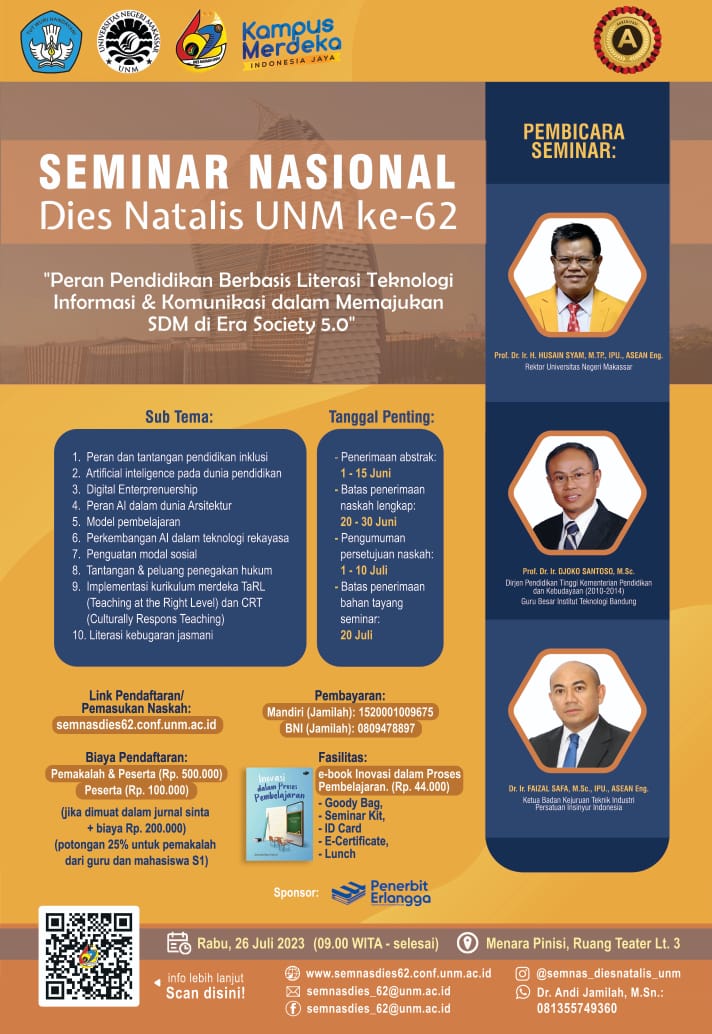Analisis Implementasi Kurikulum Merdeka pada Kompetensi Keahlian Desain dan Produksi Busana di SMKN 8 Makassar
DOI:
https://doi.org/10.59562/semnasdies.v1i1.759Keywords:
Implementation, The Independent Curriculum, Competency of Clothing Design and Production SkillsAbstract
This study aims to find out: 1) the implementation of the independent curriculum on the competence of clothing design and production expertise at SMKN 8 Makassar, 2) the constraints of implementing the independent curriculum on the competency of clothing design and production expertise at SMKN 8 Makassar, and 3) efforts to overcome these obstacles in the implementation of the independent curriculum on the competence of clothing design and production skills at SMKN 8 Makassar. The type of research used is qualitative research, the source of data is from the principal, vice principal, teacher of Fashion at SMKN 8 Makassar. Data collection techniques with document review, participatory observation and in-depth interviews. Data analysis techniques using interactive analysis by Miles and Huberman include data reduction, data display and conclusion. The results of this study indicate 1) The implementation of the independent learning curriculum in the competence of design expertise and clothing production at SMKN 8 Makassar has been applied to class XI and XII by carrying out seven stages of learning, namely: analyzing Learning Outcomes (CP) to develop learning objectives and learning objectives flow, Planning and implementing diagnostic assessments, Developing teaching modules, Adapting learning to the stages of achievement and characteristics of students, Planning, implementing, and processing formative and summative assessments, Reporting on learning progress and Evaluation of learning and assessment, 2) constraints of independent curriculum implementation on competency skills design and production of clothing at SMKN 8 Makassar on the competence of clothing design and production expertise at SMKN 8 Makassar namely teachers do not understand the substance of the Merdeka Curriculum, teachers still have difficulties in making CP (learning achievements), compiling TP (learning objectives from CP (learning achievements) which there are, difficulties in developing teaching modules, teachers do not understand the assessment standards on the independent curriculum, limited references, and time management, 3) efforts to overcome obstacles to the implementation of the independent curriculum, namely training in making teaching modules, teachers actively doing digital literacy, exploring references, dividing study hours for each element according to the difficulty level of the material
Downloads
References
Indarwati, N. (2021). Pelaksanaan Workshop untuk Meningkatkan Keterampilan Guru dalam Membimbing Kegiatan Ekstrakurikuler Tulis dan Baca Puisi Kepada Siswa Melalui Teknik Asosiasi dan Fantasi. JIRA: Jurnal Inovasi Dan Riset Akademik, 2(6), 782–791. https://doi.org/10.47387/jira.v2i6.160
Khair, U. (2018). Pembelajaran Bahasa Indonesia dan Sastra (BASASTRA) di SD dan MI. AR-RIAYAH : Jurnal Pendidikan Dasar, 2(1), 81. https://doi.org/10.29240/jpd.v2i1.261
Manik, H., C B Sihite, A., Sianturi, F., Panjaitan, S., & Hutauruk, A. J. B. (2022). Tantangan Menjadi Guru Matematika dengan Kurikulum Merdeka Belajar di Masa Pandemi Omicron Covid-19. Edumaspul: Jurnal Pendidikan, 6(1), 328–332. https://doi.org/10.33487/edumaspul.v6i1.3048
Satori, D., & Komariah, A. (2012). Metodologi Penelitian Kualitatif. Alfabeta.
Sukmadinata, N. S. (2011). Pengembangan Kurikulum Teori dan Praktek. Remaja Rosdakarya.
Usanto, S. (2022). Implementasi Kurikulum Merdeka Belajar dalam Meningkatkan Pemahaman Siswa. Cakrawala Repositori IMWI, 5(2), 494–502. https://www.cakrawala.imwi.ac.id/index.php/cakrawala/article/view/142
Wiguna, I. K. W., & Tristaningrat, M. A. N. (2022). Langkah Mempercepat Perkembangan Kurikulum Merdeka Belajar. Edukasi: Jurnal Pendidikan Dasar, 3(1), 17. https://doi.org/10.55115/edukasi.v3i1.2296
Downloads
Published
Issue
Section
License

This work is licensed under a Creative Commons Attribution-ShareAlike 4.0 International License.











 Email: semnasdies@unm.ac.id
Email: semnasdies@unm.ac.id
